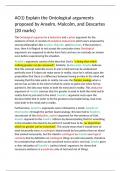Essay
A Star/ A ontological argument essay for the existence of God 90/100 A Star essay
- Institution
- WJEC
A star essay for a level philosophy exam board: wjec/eduqas grade: A star - 90/100 colour coded essay to help you get an A star! Green= scholars Red= key terminology Yellow= quotes
[Show more]



